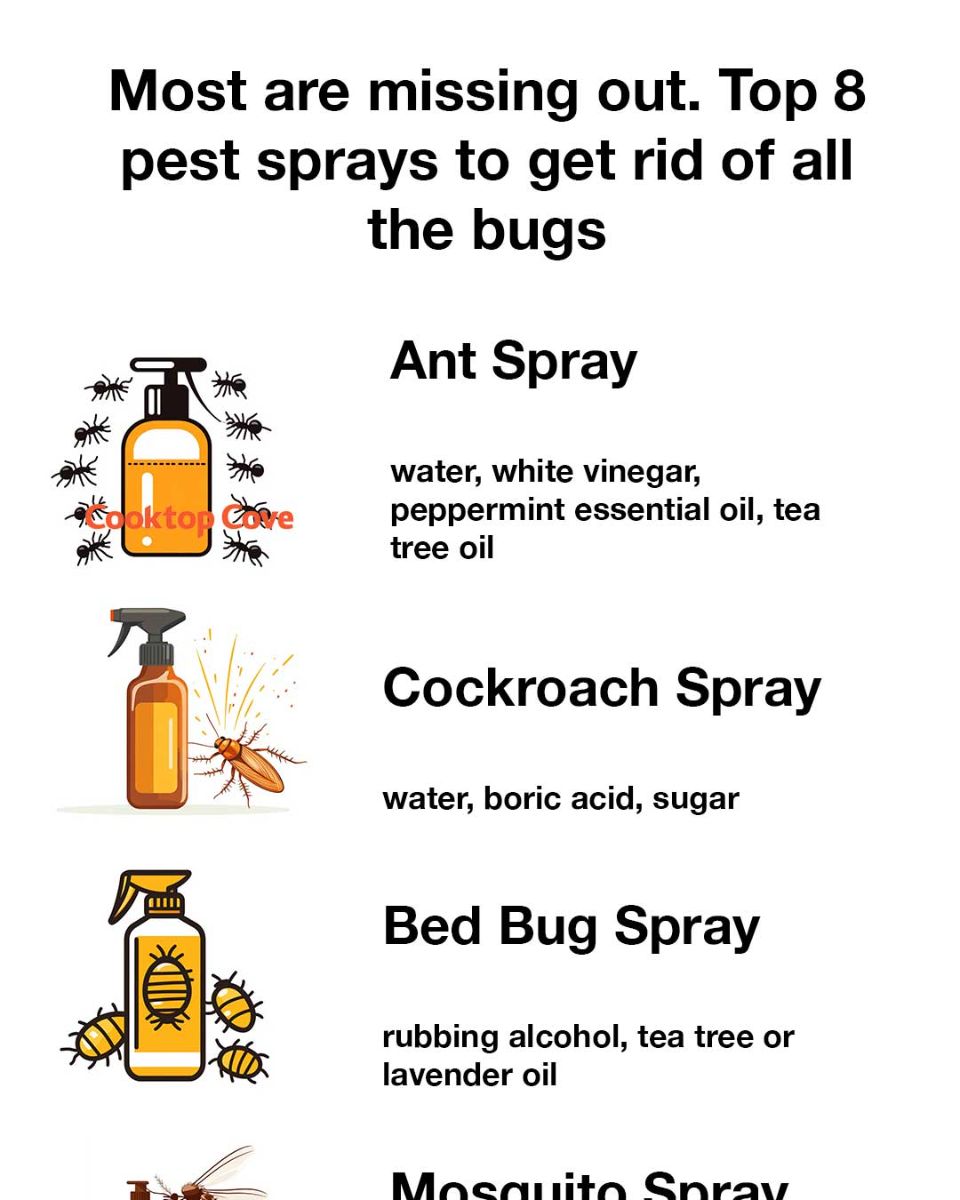Most are missing out. Top 8 pest sprays to get rid of all the bugs
Holly Owens
Contributing Writer
Print this recipe
Pest control is a critical aspect of maintaining a healthy and comfortable living environment. Pests such as ants, cockroaches, bed bugs, and mosquitoes are not only nuisances but can also pose significant health risks by spreading diseases and triggering allergies. Effective pest control helps to prevent these issues, ensuring that homes and gardens remain safe and pleasant spaces. Moreover, controlling pest populations can prevent structural damage to properties, as certain pests like termites can cause severe damage to wooden structures. Therefore, selecting the right pest spray is essential for effective pest management.
Understanding the Need for Pest Sprays
Pest sprays are a popular choice for controlling unwanted insects due to their ease of use and immediate results. Unlike traps or baits, sprays can cover large areas quickly and are effective at killing pests on contact. They are particularly useful in situations where infestations need to be controlled rapidly. Additionally, pest sprays can be tailored to target specific pests, making them versatile tools in integrated pest management strategies. Understanding the specific needs of your environment and the types of pests present is crucial in selecting the most effective spray.
Criteria for Selecting the Best Pest Sprays
When choosing a pest spray, several factors should be considered to ensure effectiveness and safety. Firstly, identify the type of pest you are dealing with, as different sprays are formulated to target specific insects. Consider the active ingredients and their safety profile, especially if you have children or pets. The ease of application and the area coverage are also important, as some sprays are designed for indoor use while others are better suited for outdoor environments. Additionally, consider the longevity of the spray’s effectiveness and whether it provides residual protection against future infestations.
1. Best Ant Spray: Recipe and Effectiveness
Ant infestations can be difficult to manage, but you can make an effective homemade ant spray using natural ingredients that disrupt their trails and deter them from returning.
DIY Natural Ant Spray Recipe:
Ingredients:
1 cup water
1 cup white vinegar
10 drops peppermint essential oil
10 drops tea tree oil
Spray bottle
Instructions:
Mix all ingredients in a spray bottle.
Shake well before each use.
Spray directly on ant trails, entry points, and around windowsills, doorways, and baseboards.
This spray repels ants by destroying their scent trails and irritating their senses. For a more aggressive approach, use a commercial spray with bifenthrin or permethrin for contact kill and residual effects.
2. Top Cockroach Spray: Ingredients and Mechanism
Cockroaches are resilient and need a potent formula. A DIY version can disrupt their nervous system and life cycle effectively.
DIY Cockroach Spray Recipe:
Ingredients:
1 cup water
1 tablespoon boric acid
1 teaspoon sugar (to attract them)
Optional: 5 drops peppermint or eucalyptus oil (for added repellent effect)
Spray bottle
Instructions:
Mix boric acid and sugar in the water until dissolved.
Pour into a spray bottle.
Spray into cracks, crevices, and under appliances where cockroaches hide.
Boric acid is lethal to roaches when ingested. For a more advanced option, commercial sprays with imiprothrin, cypermethrin, and IGRs (insect growth regulators) are highly effective.
3. Effective Bed Bug Spray: How It Works
Bed bugs are stubborn, so targeted sprays are necessary to eliminate them on contact and prevent reinfestation.
DIY Bed Bug Spray Recipe:
Ingredients:
1 cup rubbing alcohol (91% or higher)
1 teaspoon tea tree oil or lavender oil
Spray bottle
Instructions:
Combine the alcohol and essential oil in a spray bottle.
Spray liberally on mattresses, bed frames, headboards, and seams of furniture.
Allow to air dry and repeat daily until infestation is gone.
Alcohol kills bed bugs on contact, and essential oils can repel them. Commercial sprays containing pyrethroids or neonicotinoids offer a chemical option with stronger efficacy.
4. Mosquito Spray: Recipe and Benefits
Protect yourself from mosquito bites with a simple homemade repellent using natural oils.
DIY Natural Mosquito Repellent Spray:
Ingredients:
1/2 cup witch hazel or vodka
1/2 cup water
15 drops citronella essential oil
10 drops lavender essential oil
10 drops eucalyptus oil
Spray bottle
Instructions:
Mix all ingredients in a spray bottle.
Shake well before each use.
Spray on exposed skin and clothing before going outdoors.
This spray offers a pleasant-smelling, chemical-free alternative. For heavy-duty protection, use commercial sprays with DEET, picaridin, or oil of lemon eucalyptus.
5. All-Purpose Indoor Pest Spray: Comprehensive Solution
This multi-use spray tackles a range of common indoor pests like ants, roaches, and spiders.
DIY All-Purpose Indoor Pest Spray:
Ingredients:
1 cup white vinegar
1 cup water
1 tablespoon dish soap
10 drops lemon or orange essential oil
Spray bottle
Instructions:
Combine ingredients in a spray bottle.
Shake well before use.
Spray along baseboards, under sinks, behind appliances, and around entry points.
This acidic mixture kills soft-bodied insects and deters others. For broader and longer-lasting effects, commercial sprays with pyrethroids are highly effective and designed to be safe on indoor surfaces.
6. Outdoor Pest Spray: Protecting Your Garden
Protect your garden naturally or chemically depending on your preference.
DIY Garden Pest Spray (Natural):
Ingredients:
2 cups water
1 tablespoon neem oil
1 teaspoon mild dish soap
Spray bottle
